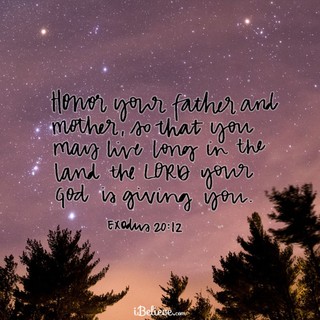- Recent Translations
- All Translations
Éxodo 20
Share
Settings
Éxodo 20 Commentary
Chapter 20
The preface to the ten commandments. (1,2) The commandments of the first table. (3-11) Of the second table. (12-17) The fear of the people. (18-21) Idolatry again forbidden. (22-26)
Verses 1-2 God speaks many ways to the children of men; by conscience, by providences, by his voice, to all which we ought carefully to attend; but he never spake at any time so as he spake the TEN COMMANDMENTS. This law God had given to man before; it was written in his heart; but sin so defaced it, that it was necessary to revive the knowledge of it. The law is spiritual, and takes knowledge of the secret thoughts, desires, and dispositions of the heart. Its grand demand is love, without which outward obedience is mere hypocrisy. It requires perfect, unfailing, constant obedience; no law in the world admits disobedience to itself. Whosoever shall keep the whole law, and yet offend in one point, he is guilty of all, ( James 2:10 ) . Whether in the heart or the conduct, in thought, word, or deed, to omit or to vary any thing, is sin, and the wages of sin is death.
Verses 3-11 The first four of the ten commandments, commonly called the FIRST table, tell our duty to God. It was fit that those should be put first, because man had a Maker to love, before he had a neighbour to love. It cannot be expected that he should be true to his brother, who is false to his God. The first commandment concerns the object of worship, JEHOVAH, and him only. The worship of creatures is here forbidden. Whatever comes short of perfect love, gratitude, reverence, or worship, breaks this commandment. Whatsoever ye do, do all the glory of God. The second commandment refers to the worship we are to render to the Lord our God. It is forbidden to make any image or picture of the Deity, in any form, or for any purpose; or to worship any creature, image, or picture. But the spiritual import of this command extends much further. All kinds of superstition are here forbidden, and the using of mere human inventions in the worship of God. The third commandment concerns the manner of worship, that it be with all possible reverence and seriousness. All false oaths are forbidden. All light appealing to God, all profane cursing, is a horrid breach of this command. It matters not whether the word of God, or sacred things, all such-like things break this commandment, and there is no profit, honour, or pleasure in them. The Lord will not hold him guiltless that taketh his name in vain. The form of the fourth commandment, "Remember," shows that it was not now first given, but was known by the people before. One day in seven is to be kept holy. Six days are allotted to worldly business, but not so as to neglect the service of God, and the care of our souls. On those days we must do all our work, and leave none to be done on the sabbath day. Christ allowed works of necessity, charity, and piety; for the sabbath was made for man, and not man for the sabbath, Mr. 2:27 ; but all works of luxury, vanity, or self-indulgence in any form, are forbidden. Trading, paying wages, settling accounts, writing letters of business, worldly studies, trifling visits, journeys, or light conversation, are not keeping this day holy to the Lord. Sloth and indolence may be a carnal, but not a holy rest. The sabbath of the Lord should be a day of rest from worldly labour, and a rest in the service of God. The advantages from the due keeping of this holy day, were it only to the health and happiness of mankind, with the time it affords for taking care of the soul, show the excellency of this commandment. The day is blessed; men are blessed by it, and in it. The blessing and direction to keep holy are not limited to the seventh day, but are spoken of the sabbath day.
Verses 12-17 The laws of the SECOND table, that is, the last six of the ten commandments, state our duty to ourselves and to one another, and explain the great commandment, Thou shalt love thy neighbour as thyself, ( Luke 10:27 ) . Godliness and honesty must go together. The fifth commandment concerns the duties we owe to our relations. Honour thy father and thy mother, includes esteem of them, shown in our conduct; obedience to their lawful commands; come when they call you, go where they send you, do what they bid you, refrain from what they forbid you; and this, as children, cheerfully, and from a principle of love. Also submission to their counsels and corrections. Endeavouring, in every thing, to comfort parents, and to make their old age easy; maintaining them if they need support, which our Saviour makes to be particularly intended in this commandment, ( Matthew 15:4-6 ) . Careful observers have noted a peculiar blessing in temporal things on obedient, and the reverse on disobedient children. The sixth commandment requires that we regard the life and the safety of others as we do our own. Magistrates and their officers, and witnesses testifying the truth, do not break this command. Self-defence is lawful; but much which is not deemed murder by the laws of man, is such before God. Furious passions, stirred up by anger or by drunkenness, are no excuse: more guilty is murder in duels, which is a horrible effect of a haughty, revengeful spirit. All fighting, whether for wages, for renown, or out of anger and malice, breaks this command, and the bloodshed therein is murder. To tempt men to vice and crimes which shorten life, may be included. Misconduct, such as may break the heart, or shorten the lives of parents, wives, or other relatives, is a breach of this command. This command forbids all envy, malice, hatred, or anger, all provoking or insulting language. The destruction of our own lives is here forbidden. This commandment requires a spirit of kindness, longsuffering, and forgiveness. The seventh commandment concerns chastity. We should be as much afraid of that which defiles the body, as of that which destroys it. Whatever tends to pollute the imagination, or to raise the passions, falls under this law, as impure pictures, books, conversation, or any other like matters. The eighth commandment is the law of love as it respects the property of others. The portion of worldly things allotted us, as far as it is obtained in an honest way, is the bread which God hath given us; for that we ought to be thankful, to be contented with it, and, in the use of lawful means, to trust Providence for the future. Imposing upon the ignorance, easiness, or necessity of others, and many other things, break God's law, though scarcely blamed in society. Plunderers of kingdoms though above human justice, will be included in this sentence. Defrauding the public, contracting debts without prospect of paying them, or evading payment of just debts, extravagance, all living upon charity when not needful, all squeezing the poor in their wages; these, and such things, break this command; which requires industry, frugality, and content, and to do to others, about worldly property, as we would they should do to us. The ninth commandment concerns our own and our neighbour's good name. This forbids speaking falsely on any matter, lying, equivocating, and any way devising or designing to deceive our neighbour. Speaking unjustly against our neighbour, to hurt his reputation. Bearing false witness against him, or in common conversation slandering, backbiting, and tale-bearing; making what is done amiss, worse than it is, and in any way endeavouring to raise our reputation upon the ruin of our neighbour's. How much this command is every day broken among persons of all ranks! The tenth commandment strikes at the root; Thou shalt not covet. The others forbid all desire of doing what will be an injury to our neighbour; this forbids all wrong desire of having what will gratify ourselves.
Verses 18-21 This law, which is so extensive that we cannot measure it, so spiritual that we cannot evade it, and so reasonable that we cannot find fault with it, will be the rule of the future judgment of God, as it is for the present conduct of man. If tried by this rule, we shall find our lives have been passed in transgressions. And with this holy law and an awful judgment before us, who can despise the gospel of Christ? And the knowledge of the law shows our need of repentance. In every believer's heart sin is dethroned and crucified, the law of God is written, and the image of God renewed. The Holy Spirit enables him to hate sin and flee from it, to love and keep this law in sincerity and truth; nor will he cease to repent.
Verses 22-26 Moses having entered into the thick darkness, God there spake in his hearing all that follows from hence to the end of chap. 23, which is mostly an exposition of the ten commandments. The laws in these verses relate to God's worship. The Israelites are assured of God's gracious acceptance of their devotions. Under the gospel, men are encouraged to pray every where, and wherever God's people meet in his name to worship him, he will be in the midst of them; there he will come unto them, and will bless them.
Éxodo 20 Commentaries
Footnotes 3
Chapter Summary
INTRODUCTION TO EXODUS 20
In this chapter we have an account of the giving of the law on Mount Sinai; the preface to it, Ex 20:1,2, the ten commandments it consists of, Ex 20:8-17, the circumstances attending it, which caused the people to remove at some distance, Ex 20:18, when they desired of Moses, that he would speak to them and not God, who bid them not fear, since this was for the trial of them; but still they kept at a distance, while Moses drew nigh to God, Ex 20:19-21 who ordered him to caution the children of Israel against idolatry, and directed what sort of an altar he would have made whereon to offer their sacrifices, promising that where his name was recorded he would grant his presence and blessing, Ex 20:22-26.


